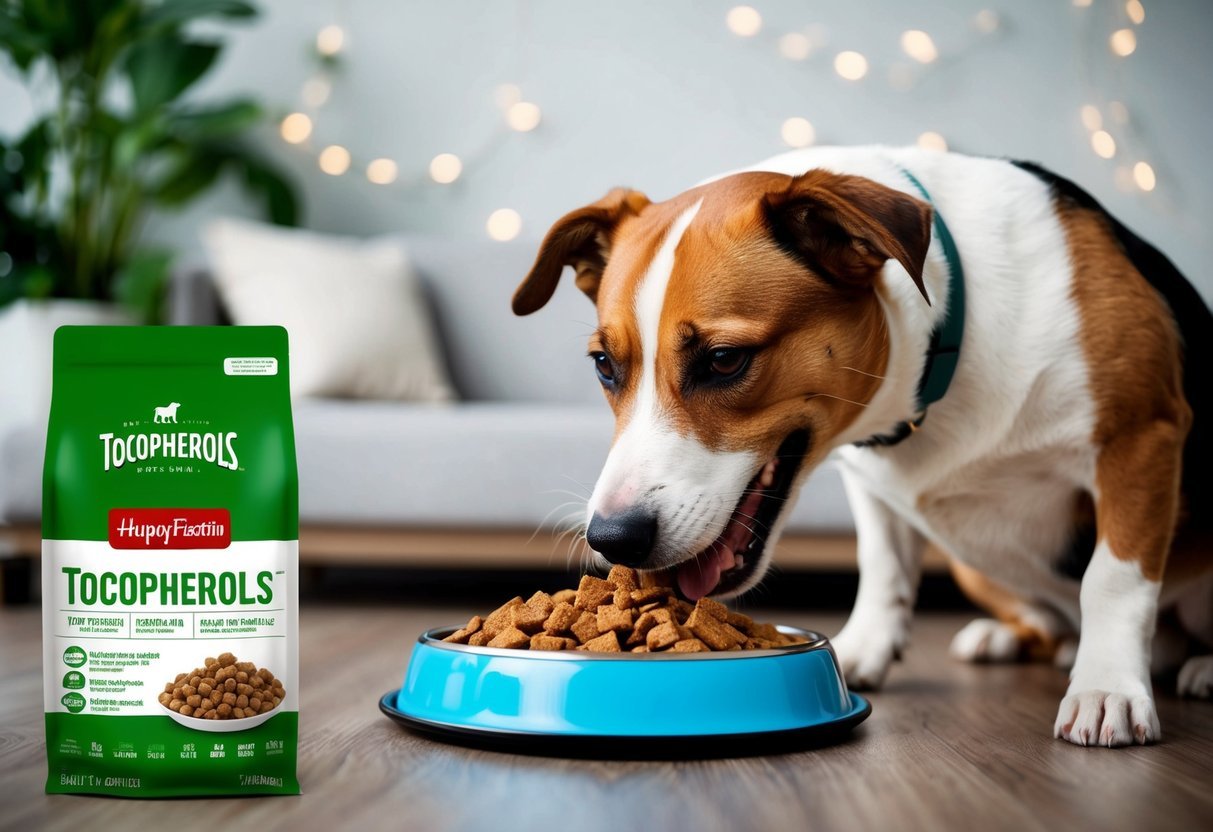When it comes to your dog’s nutrition, you might have heard about tocopherols and their role in dog food. These powerful compounds are more than just fancy ingredients; they help keep your dog’s food fresh and support their overall health. Understanding what tocopherols are and why they matter can make a big difference in your pup’s diet.
In this article, you’ll discover six surprising facts about tocopherols that might change how you view your dog’s food.
From their antioxidant benefits to their role in preserving kibble, you’ll learn why these vitamin E compounds are crucial for your furry friend.
Get ready to dive into the world of dog food and uncover what makes tocopherols so special!
1) Tocopherol Benefits for Canine Health

Tocopherols are a form of vitamin E that offer several health benefits for your dog.
They act as antioxidants, helping to protect cells from damage caused by free radicals.
This can support your dog’s immune system and overall health.
Understanding what tocopherols are and why they matter can make a big difference in your pup’s diet.
Using dog food that contains tocopherols can help with skin and coat health.
The vitamin E properties promote healthy fur and can reduce dryness or irritation on your pup’s skin.
Tocopherols also play a role in cell function.
This means they help maintain healthy cells in your dog’s body, which is essential for growth and repair.
Additionally, tocopherols can support heart health.
They may help improve circulation and reduce the risk of heart problems as your furry friend ages.
Including tocopherols in your dog’s diet may also improve their energy levels.
A better-functioning body means your dog can enjoy more playtime with you.
Many quality dog foods use tocopherols as natural preservatives.
This means not only are they good for your furry friend, but they also help keep the food fresh longer.
Vitamin E’s Role in Dog Nutrition

Vitamin E is an important nutrient for your dog.
It acts as an antioxidant, helping to protect cells from damage caused by free radicals.
This can support your dog’s immune system and overall health.
In dog food, tocopherols are a natural form of vitamin E. They help keep the food fresh by preventing fats and oils from going bad.
This not only keeps the food tasty but also ensures it retains its nutritional value.
A healthy dose of vitamin E can improve skin and coat health.
It supports their eyesight and can even help in the prevention of certain diseases.
You want your dog to thrive, and vitamin E plays a part in their well-being.
When choosing dog food, look for products that list tocopherols clearly.
Foods with mixed tocopherols offer a variety of vitamin E compounds, providing even more benefits for your furry friend.
Natural Tocopherols vs Synthetic

When it comes to tocopherols in dog food, there are two main types: natural and synthetic.
Natural tocopherols are usually labeled as d-alpha-tocopherol.
They come from plant sources and are often considered more beneficial for your dog.
Synthetic tocopherols, known as all-rac-alpha-tocopherol, are created in a lab.
Some studies suggest that natural tocopherols can be more effective due to their structure.
Natural tocopherols may also be safer.
High doses of synthetic forms may lead to issues like vitamin absorption problems.
Make sure to choose food with natural sources when picking out dog food for your furry friend.
In dog food, you’ll often find both types.
However, always check the label.
Opt for products that prioritize natural tocopherols for your dog’s health.
4) Why Dogs Need Antioxidants

Antioxidants are important for your dog’s health.
They help fight free radicals, which can cause cell damage.
This damage might lead to health issues over time.
Tocopherols, a type of antioxidant found in dog food, are especially helpful.
They help keep your pup’s cells healthy and can reduce the risk of chronic diseases.
Your dog’s immune system also benefits from antioxidants.
A strong immune system means your dog can better fight off infections and illness.
Moreover, antioxidants like tocopherols can support skin and coat health.
A healthy coat can mean less scratching and better overall comfort for your furry friend.
In short, including antioxidants in your dog’s diet can lead to a happier, healthier life.
5) Label Reading for Tocopherols

When you check your dog’s food label, look for tocopherols listed among the ingredients.
They are often labeled as “mixed tocopherols.” This means the product contains different forms of vitamin E.
Tocopherols are used as natural preservatives to keep the food fresh.
They also help protect the nutrients in the food from breaking down.
Nobody wants to feed their dog spoiled food!
If you’re curious about the benefits, tocopherols also act as antioxidants.
Antioxidants can support your dog’s overall health by protecting their cells.
Understanding the label is key to choosing the right food for your pup.
Look for mentions of tocopherols when trying to find quality and safe options.
Next time you shop, take a moment to scan the ingredient list.
Knowing what to look for can help you make informed choices and keep your dog happy and healthy.
6) Safety of Tocopherols in Dog Food

Tocopherols are generally safe for dogs.
They come from the vitamin E family and are often used as natural preservatives in dog food.
This means you can find them in many brands you trust.
These compounds help preserve food and prevent spoilage.
They also provide health benefits by acting as antioxidants, which protect your dog’s cells from damage.
This means tocopherols not only help keep food fresh but also contribute to your dog’s well-being.
When you read the label, you might see them listed as “mixed tocopherols.” They’re common in both premium and everyday dog foods.
Many pet owners prefer these natural options over artificial preservatives.
It’s important to note that tocopherols are safe in the amounts found in dog food.
If you have any concerns, talking to your vet can help ease your mind.
They can give you the best advice tailored to your dog’s specific needs.
Understanding Tocopherols in Dog Food

Tocopherols are important compounds in dog food that serve multiple purposes.
They help keep the food fresh and contribute to your dog’s health through their antioxidant properties.
Let’s take a closer look at what tocopherols are and why they’re used.
What Are Tocopherols?
Tocopherols are a group of compounds that belong to the Vitamin E family.
You’ll often find them listed in the ingredients of dog food and treats.
These natural preservatives come from plant oils and play a role in ensuring the food remains fresh.
Tocopherols help protect the fats in dog food from oxidation, which can lead to spoilage.
They are also beneficial for your dog’s body as they act as antioxidants.
This means they help combat free radicals, which can damage cells.
In essence, tocopherols contribute to both the longevity of the food and your dog’s health.
Why Are They Used in Dog Food?
Tocopherols are used in dog food mainly for their preservative qualities.
By preventing oxidation, they keep the food from going rancid.
This is important for maintaining the nutritional value and taste of the food your dog eats.
Using tocopherols is a safer choice compared to artificial preservatives.
They help ensure that your dog’s food stays fresh without harmful chemicals.
Plus, tocopherols provide a source of vitamin E, which is essential for your dog’s overall health.
Including this vitamin can support immune function, skin health, and more.
Health Benefits of Tocopherols for Dogs

Tocopherols, a form of vitamin E, offer several health benefits for your dog.
They can boost your furry friend’s well-being in meaningful ways.
Let’s dive into some of these key benefits, focusing on how they can help protect your dog’s body and keep their coat looking great.
Antioxidant Properties
Tocopherols are powerful antioxidants.
This means they help fight off harmful free radicals in your dog’s body.
Free radicals can cause cell damage, leading to health issues over time.
By including tocopherols in your dog’s diet, you can support their immune system and overall health.
These antioxidants work to protect vital organs and tissues.
In addition, they may reduce the risk of chronic diseases.
Including foods with tocopherols can help your dog feel more energetic and lively.
Supporting a Healthy Coat
If you’ve ever admired your dog’s shiny coat, tocopherols play a role in that too! They help maintain healthy skin and fur by providing necessary nutrients.
Tocopherols can enhance skin hydration and elasticity.
This can prevent dryness and irritation.
A nutritious diet rich in tocopherols can also combat issues like itching or flaking.
Dogs with healthy coats often shed less and have a more manageable grooming routine.
So, making sure your dog gets enough tocopherols can lead to a vibrant, beautiful coat and happier skin.
Frequently Asked Questions
You likely have questions about tocopherols in dog food.
This section addresses common concerns regarding their safety, effects on health, and how they differ from tocopherols in human food.
What exactly are mixed tocopherols found in dog food?
Mixed tocopherols are a form of vitamin E used as natural preservatives in dog food.
They help keep fats from going rancid, allowing your dog’s food to stay fresh longer.
Can mixed tocopherols cause allergies in dogs?
Allergies to mixed tocopherols are very rare.
Most dogs tolerate them well, as they are naturally occurring compounds.
If you notice any unusual reactions after feeding your dog a food with tocopherols, it’s best to consult your vet.
Are there any side effects from using tocopherol preservatives in dog food?
Generally, tocopherol preservatives are safe for dogs.
They may even offer health benefits as antioxidants.
However, if your dog has specific dietary restrictions or allergies, check with your veterinarian before making any changes.
How do mixed tocopherols impact a dog’s health and safety?
Mixed tocopherols play a crucial role in promoting your dog’s health.
They act as antioxidants, helping to prevent cell damage and support the immune system.
This can lead to a longer, healthier life for your pet.
What role do tocopherols play in making dogs feel full when they eat their kibble?
Tocopherols don’t directly affect your dog’s feeling of fullness.
However, by preserving the quality of the food, they keep your dog’s diet nutritious.
This can support a healthy appetite and overall satisfaction with their meals.
How do tocopherols in dog food differ from those in human food?
Tocopherols in dog food are often sourced differently than those in human food.
While they serve similar purposes as antioxidants, the formulations and concentrations may vary.
Always check the labels if you’re curious about what your pet is eating.

